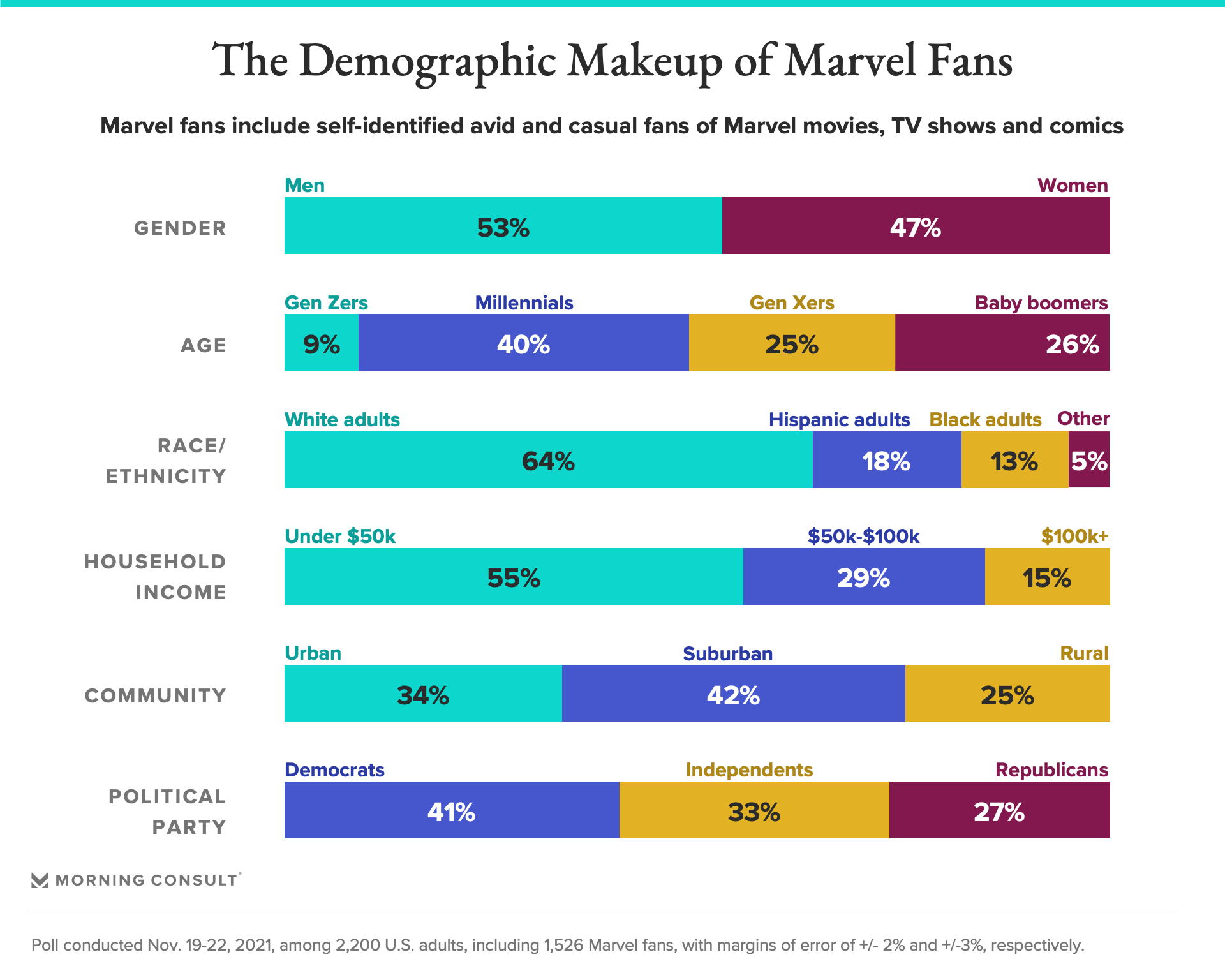Is Gen Z Too Cool for Marvel? Just 9% of Marvel Fans Identify as Part of the Generation

MARVEL'S NEXT PHASE
This story is part of a nine-part series considering the business future of Disney's crown jewel, the Marvel Cinematic Universe. One of the most lucrative properties in the history of entertainment, the MCU is suddenly threatened from multiple fronts: Several of its beloved heroes have been retired, the theatrical model is in peril and the COVID-19 pandemic has accelerated massive shifts in the media consumption habits of superhero fans. Marvel's future success is not necessarily guaranteed. In order to continue its dominance of global culture over the course of its next phase, the Disney-owned brand will have to adapt.
Some consumers claim they’re getting sick of superheroes, but the lion’s share of Americans still say they’re fans, according to new data from Morning Consult. However, exactly how those fans exercise their fandom varies widely depending on their generation.
Sixty-eight percent of U.S. adults identified themselves as “casual” or “avid” fans of superheroes in general. Roughly the same share (67 percent) said they’re fans of movies and TV shows from the Marvel franchise in particular. Americans are slightly less enthusiastic about content from the DC franchise, but a healthy majority (64 percent) still said they’re fans of DC movies and shows.
Millennials, meanwhile, continue to be the driving force behind Marvel’s success, but Gen Zers account for a much smaller portion of Marvel’s fanbase — perhaps a sign the company will have to adjust how it markets its heroes moving forward.

What the numbers say
- Marvel fans are slightly more likely to be male (53 percent) than female (47 percent). The demographic is also overwhelmingly white, while 18 percent of fans are Hispanic and 13 percent are Black.
- Fans of Marvel comics, films or TV shows are most likely to be millennials (40 percent). Roughly one-quarter of the Marvel fan base are baby boomers and Gen Xers, while Gen Zers account for just 9 percent of Marvel fans.
- More than half (55 percent) of Marvel fans have a household income of less than $50,000 a year. They’re slightly more likely to live in suburban areas (42 percent) than urban (34 percent) or rural (25 percent) ones.
- Among political identifications, Marvel fans are most likely to be Democrats at 41 percent, ahead of independents (33 percent) and Republicans (27 percent).
Millennials Are By Far Most Engaged With Superhero Fandom
What the numbers say
- Despite slowly increasing superhero fatigue, 44 percent of Americans said they watch superhero movies at least once a month.
- The share who turn on a superhero movie at least once a month increases to 61 percent when considering only self-identified Marvel fans. Sixty-six percent of millennials said they watch superhero films with the same frequency.
- Superhero TV shows — which began in the 1950s with “Adventures of Superman” and are now common on network television and streaming services — are roughly as popular as superhero movies. Forty-two percent of adults said they watch superhero TV shows at least once a month, including 58 percent of Marvel fans and 60 percent of millennials.
- Comic books are less popular among the general public, 22 percent of whom said they read comics at least once a month. Again, millennials are driving interest in this activity: 39 percent said they read comics at least once a month, and 1 in 3 said they buy comic-related merchandise that often.
The impact
Marvel fandom is undeniably a powerful force, with untold millions of fans buying tickets to films, streaming TV series and attending conventions each year. And as Marvel brings more female characters and superheroes of color to the screen, the brand could grow even further. Educating fans on these new heroes won’t be easy, but it’ll likely be necessary in order to continue engaging its core audience and expand into new ones.
Marvel, in short, has to appeal to the next generation of fans. Gen Z adults are more likely to participate in several fan-related activities than the general public, but they’re not nearly as invested as their predecessors. Leaning into streaming is one way Marvel has already started to try to reach Gen Z consumers, but the legacy franchises will have to evolve in more fundamental ways beyond experimenting with distribution if they hope to keep up with rapidly changing consumer habits and preferences.
The survey was conducted Nov. 19-22, 2021, among 2,200 U.S. adults, with a margin of error of plus or minus 2 percentage points.
Correction: A previous version of the Marvel fans demographic chart miscategorized the share of non-Hispanic white adults, non-Hispanic Black adults and non-Hispanic adults of other races who identify as Marvel fans, leading to incorrect percentages.
Sarah Shevenock previously worked at Morning Consult as a reporter covering the business of entertainment.
Alyssa Meyers previously worked at Morning Consult as a reporter covering brands and marketing.
Related content

49% of Young Viewers Would Cancel Netflix if It Loses 'Office,' 'Friends,' Disney, Marvel

As Yoon Visits White House, Public Opinion Headwinds Are Swirling at Home
